28 Best Academic Search Engines That make your research easier
This post may contain affiliate links that allow us to earn a commission at no expense to you. Learn more

If you’re a researcher or scholar, you know that conducting effective online research is a critical part of your job. And if you’re like most people, you’re always on the lookout for new and better ways to do it.
I’m sure you are familiar with some research databases. But, top researchers keep an open mind and are always looking for inspiration in unexpected places.
This article aims to give you an edge over researchers that rely mainly on Google for their entire research process.
Our list of 28 academic search engines will start with the more familiar to less.
Table of Contents

#1. Google Scholar

Google Scholar is an academic search engine that indexes the full text or metadata of scholarly literature across an array of publishing formats and disciplines.
Great for academic research, you can use Google Scholar to find articles from academic journals, conference proceedings, theses, and dissertations. The results returned by Google Scholar are typically more relevant and reliable than those from regular search engines like Google.
Tip: You can restrict your results to peer-reviewed articles only by clicking on the “Scholarly”
- Scholarly results are typically more relevant and reliable than those from regular search engines like Google.
- You can restrict your results to peer-reviewed articles only by clicking on the “Scholarly” tab.
- Google Scholar database Coverage is extensive, with approx. 200 million articles indexed.
- Abstracts are available for most articles.
- Related articles are shown, as well as the number of times an article has been cited.
- Links to full text are available for many articles.
- Abstracts are only a snippet of the full article, so you might need to do additional searching to get the full information you need.
- Not all articles are available in full text.
Google Scholar is completely free.
#2. ERIC (Education Resources Information Center)
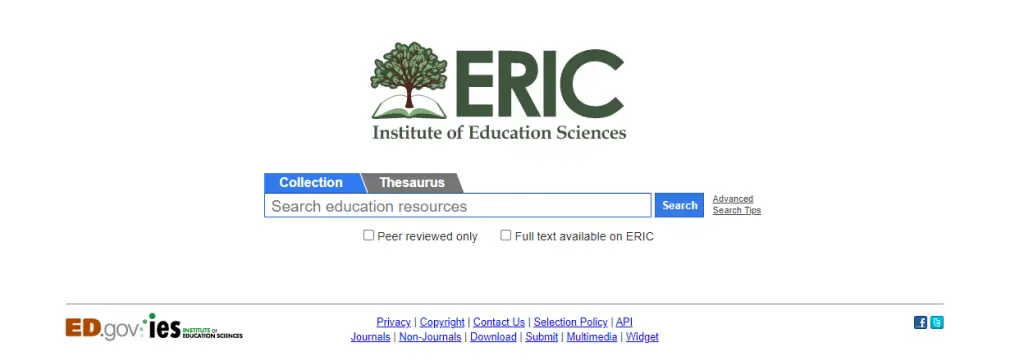
ERIC (short for educational resources information center) is a great academic search engine that focuses on education-related literature. It is sponsored by the U.S. Department of Education and produced by the Institute of Education Sciences.
ERIC indexes over a million articles, reports, conference papers, and other resources on all aspects of education from early childhood to higher education. So, search results are more relevant to Education on ERIC.
- Extensive coverage: ERIC indexes over a million articles, reports, and other resources on all aspects of education from early childhood to higher education.
- You can limit your results to peer-reviewed journals by clicking on the “Peer-Reviewed” tab.
- Great search engine for educators, as abstracts are available for most articles.
ERIC is a free online database of education-related literature.
You might also like:
- SCI Journal: Science Journal Impact Factor
- 15 Best Websites to Download Research Papers for Free
- 11 Best Academic Writing Tools For Researchers 2024
- 10 Best Reference Management Software for Research 2024
- Academic Tools
#3. Wolfram Alpha

Wolfram Alpha is a “computational knowledge engine” that can answer factual questions posed in natural language. It can be a useful search tool.
Type in a question like “What is the square root of 64?” or “What is the boiling point of water?” and Wolfram Alpha will give you an answer.
Wolfram Alpha can also be used to find academic articles. Just type in your keywords and Wolfram Alpha will generate a list of academic articles that match your query.
Tip: You can restrict your results to peer-reviewed journals by clicking on the “Scholarly” tab.
- Can answer factual questions posed in natural language.
- Can be used to find academic articles.
- Results are ranked by relevance.
- Results can be overwhelming, so it’s important to narrow down your search criteria as much as possible.
- The experience feels a bit more structured but it could also be a bit restrictive
Wolfram Alpha offers a few pricing options, including a “Pro” subscription that gives you access to additional features, such as the ability to create custom reports. You can also purchase individual articles or download them for offline use.
Pro costs $5.49 and Pro Premium costs $9.99
#4. iSEEK Education
- 15 Best Websites To Download Research Papers For Free
- 30+ Essential Software For Researchers
- 15 Best Academic Research Trend Prediction Platforms
- 15 Best Academic Networking And Collaboration Platforms
iSEEK is a search engine targeting students, teachers, administrators, and caregiver. It’s designed to be safe with editor-reviewed content.
iSEEK Education also includes a “Cited by” feature which shows you how often an article has been cited by other researchers.
- Editor-reviewed content.
- “Cited by” feature shows how often an article has been cited by other researchers.
- Limited to academic content.
- Doesn’t have the breadth of coverage that some of the other academic search engines have.
iSEEK Education is free to use.
#5. BASE (Bielefeld Academic Search Engine)
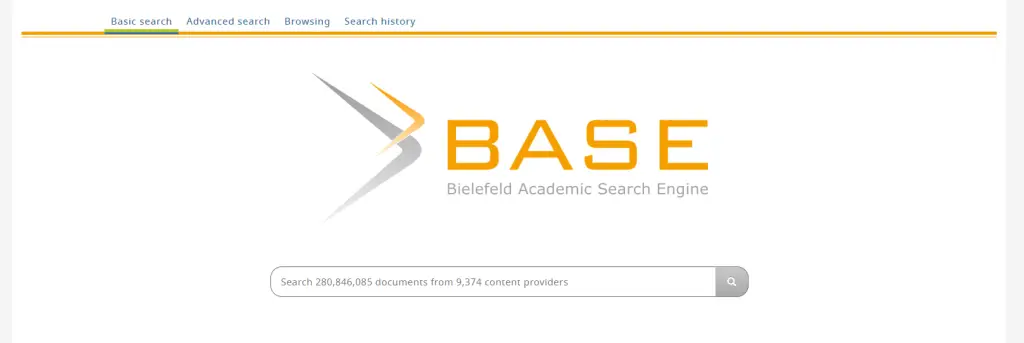
BASE is hosted at Bielefeld University in Germany and that’s where it name stems from (Bielefeld Academic Search Engine).
Known as “one of the most comprehensive academic web search engines,” it contains over 100 million documents from 4,000 different sources.
Users can narrow their search using the advanced search option, so regardless of whether you need a book, a review, a lecture, a video or a thesis, BASE has what you need.
BASE indexes academic articles from a variety of disciplines, including the arts, humanities, social sciences, and natural sciences.
- One of the world’s most voluminous search engines,
- Indexes academic articles from a variety of disciplines, especially for academic web resources
- Includes an “Advanced Search” feature that lets you restrict your results to peer-reviewed journals.
- Doesn’t include abstracts for most articles.
- Doesn’t have related articles, references, cited by
BASE is free to use.
- 10 Best Reference Management Software for Research 2023
- 15 Best Academic Networking and Collaboration Platforms
- 30+ Essential Software for Researchers
- 15 Best Academic Blogging and Content Management
- 11 Best Academic Writing Tools For Researchers
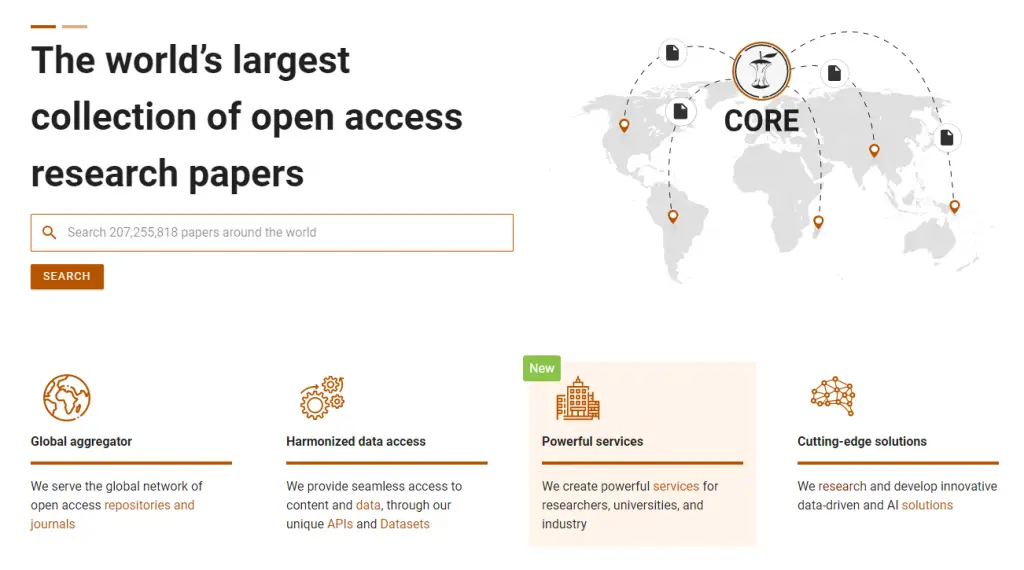
CORE is an academic search engine that focuses on open access research papers. A link to the full text PDF or complete text web page is supplied for each search result. It’s academic search engine dedicated to open access research papers.
- Focused on open access research papers.
- Links to full text PDF or complete text web page are supplied for each search result.
- Export formats include BibTeX, Endnote, RefWorks, Zotero.
- Coverage is limited to open access research papers.
- No abstracts are available for most articles.
- No related articles, references, or cited by features.
CORE is free to use.
- Best Plagiarism Checkers for Research Papers in 2024
#7. Science.gov

Science.gov is a search engine developed and managed by the United States government. It includes results from a variety of scientific databases, including NASA, EPA, USGS, and NIST.
US students are more likely to have early exposure to this tool for scholarly research.
- Coverage from a variety of scientific databases (200 million articles and reports).
- Links to full text are available for some articles.
Science.gov is free to use.
- 15 Best Academic Journal Discovery Platforms
- Sci Hub Review
#8. Semantic Scholar

Semantic Scholar is a recent entrant to the field. Its goal is to provide more relevant and effective search results via artificial intelligence-powered methods that detect hidden relationships and connections between research topics.
- Powered by artificial intelligence, which enhances search results.
- Covers a large number of academic articles (approx. 40 million).
- Related articles, references, and cited by features are all included.
- Links to full text are available for most articles.
Semantic Scholar is free to use.
- 11 Best Academic Writing Tools For Researchers
- 10 Best Reference Management Software for Research
- 15 Best Academic Journal Discovery Platforms
#9. RefSeek

RefSeek searches more than five billion documents, including web pages, books, encyclopedias, journals, and newspapers.
This is one of the free search engines that feels like Yahoo with a massive directory. It could be good when you are just looking for research ideas from unexpected angles. It could lead you to some other database that you might not know such as the CIA The World Factbook, which is a great reference tool.
- Searches more than five billion documents.
- The Documents tab is very focused on research papers and easy to use.
- Results can be filtered by date, type of document, and language.
- Good source for free academic articles, open access journals, and technical reports.
- The navigation and user experience is very dated even to millenials…
- It requires more than 3 clicks to dig up interesting references (which is how it could lead to you something beyond the 1st page of Google)
- The top part of the results are ALL ads (well… it’s free to use)
RefSeek is free to use.
#10. ResearchGate

A mixture of social networking site + forum + content databases where researchers can build their profile, share research papers, and interact with one another.
Although it is not an academic search engine that goes outside of its site, ResearchGate ‘s library of works offers an excellent choice for any curious scholar.
There are more than 100 million publications available on the site from over 11 million researchers. It is possible to search by publication, data, and author, as well as to ask the researchers questions.
- A great place to find research papers and researchers.
- Can follow other researchers and get updates when they share new papers or make changes to their profile.
- The network effect can be helpful in finding people who have expertise in a particular topic.
- Interface is not as user friendly
- Can be overwhelming when trying to find relevant papers.
- Some papers are behind a paywall.
ResearchGate is free to use.
- 15 Best Academic Research Trend Prediction Platforms
- 25 Best Tools for Tracking Research Impact and Citations
#11. DataONE Search (formerly CiteULike)
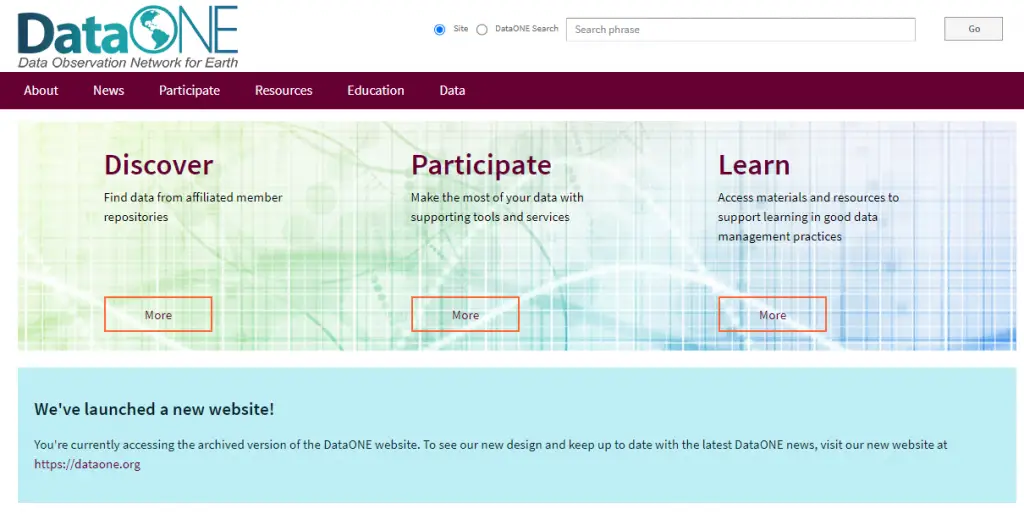
A social networking site for academics who want to share and discover academic articles and papers.
- A great place to find academic papers that have been shared by other academics.
- Some papers are behind a paywall
CiteULike is free to use.
#12. DataElixir

DataElixir is deigned to help you find, understand and use data. It includes a curated list of the best open datasets, tools and resources for data science.
- Dedicated resource for finding open data sets, tools, and resources for data science.
- The website is easy to navigate.
- The content is updated regularly
- The resources are grouped by category.
- Not all of the resources are applicable to academic research.
- Some of the content is outdated.
DataElixir is free to use.
#13. LazyScholar – browser extension
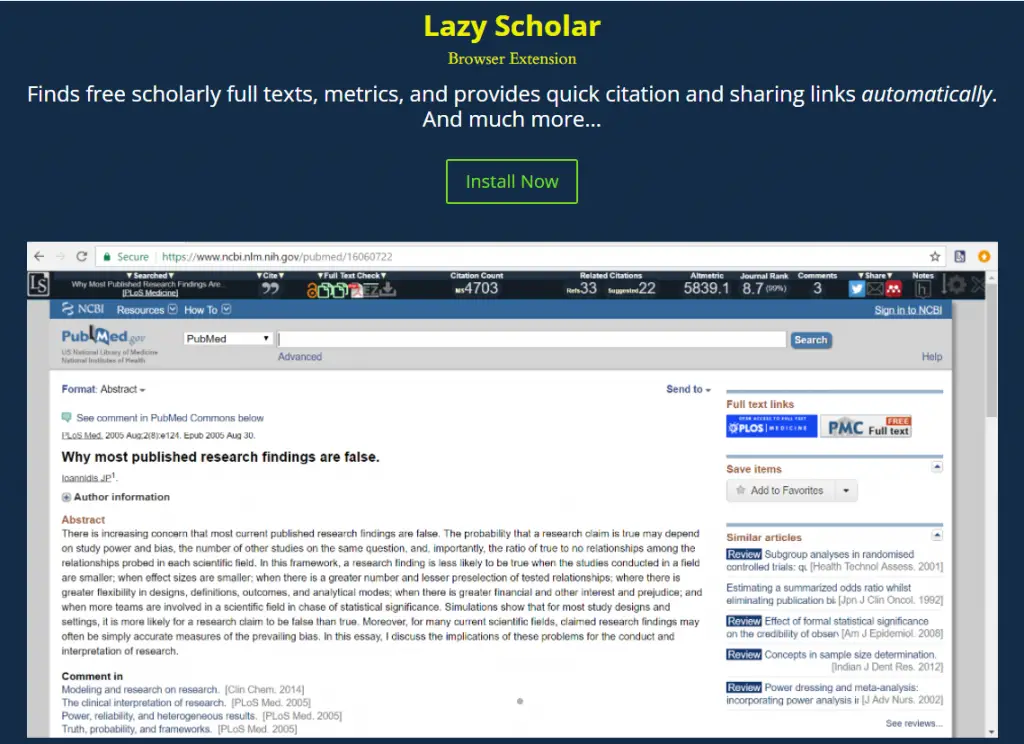
LazyScholar is a free browser plugin that helps you discover free academic full texts, metrics, and instant citation and sharing links. Lazy Scholar is created Colby Vorland, a postdoctoral fellow at Indiana University.
- It can integrate with your library to find full texts even when you’re off-campus.
- Saves your history and provides an interface to find it.
- A pre-formed citation is availlable in over 900 citation styles.
- Can recommend you topics and scans new PubMed listings to suggest new papers
- Results can be a bit hit or miss
LazyScholar is free to use.
#14. CiteseerX – digital library from PenState

CiteseerX is a digital library stores and indexes research articles in Computer Science and related fields. The site has a robust search engine that allows you to filter results by date, author.
- Searches a large number of academic papers.
- Results can be filtered by date, author, and topic.
- The website is easy to use.
- You can create an account and save your searches for future reference.
CiteseerX is free to use.
- Surfer Review: Is It Worth It?
- 25 Best Tools For Tracking Research Impact And Citations
#15. The Lens – patents search
The Lens or the Patent Lens is an online patent and scholarly literature search facility, provided by Cambia, an Australia-based non-profit organization.

- Searches for a large number of academic papers.
The price range can be free for non-profit use to $5,000 for commercial enterprise.
#16. Fatcat – wiki for bibliographic catalog
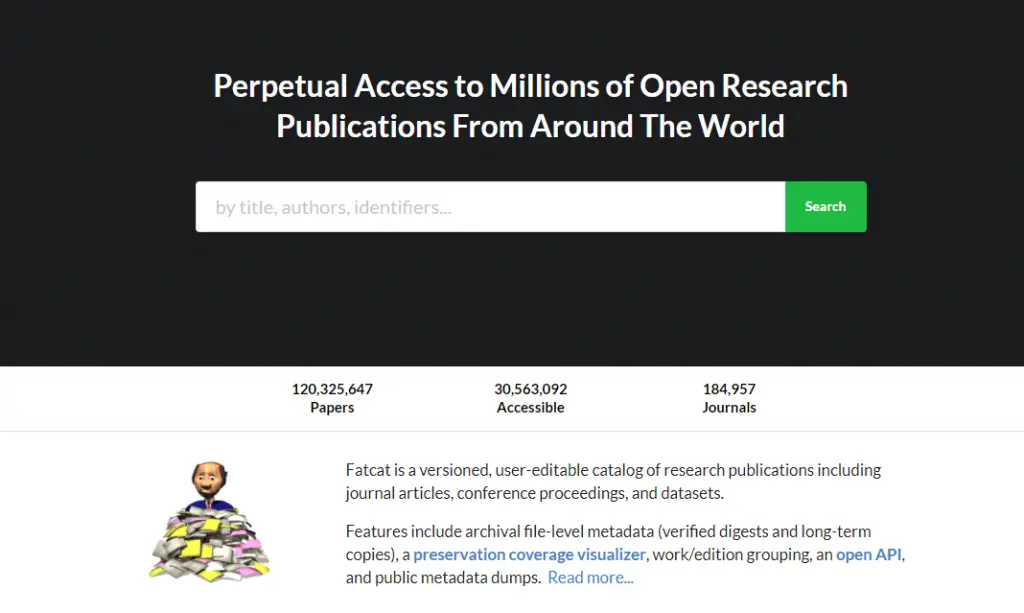
Fatcat is an open bibliographic catalog of written works. The scope of works is somewhat flexible, with a focus on published research outputs like journal articles, pre-prints, and conference proceedings. Records are collaboratively editable, versioned, available in bulk form, and include URL-agnostic file-level metadata.
- Open source and collaborative
- You can be part of the community that is very focused on its mission
- The archival file-level metadata (verified digests and long-term copies) is a great feature.
- Could prove to be another rabbit hole
- People either love or hate the text-only interface
#17. Lexis Web – Legal database

Are you researching legal topics? You can turn to Lexis Web for any law-related questions you may have. The results are drawn from legal sites and can be filtered based on criteria such as news, blogs, government, and commercial. Additionally, users can filter results by jurisdiction, practice area, source and file format.
- Results are drawn from legal sites.
- Filters are available based on criteria such as news, blogs, government, and commercial.
- Users can filter results by jurisdiction, practice area, source and file format.
- Not all law-related questions will be answered by this search engine.
- Coverage is limited to legal sites only.
Lexis Web is free for up to three searches per day. After that, a subscription is required.
#18. Infotopia – part of the VLRC family

Infotopia touts itself as an “alternative to Google safe search.” Scholarly book results are curated by librarians, teachers, and other educational workers. Users can select from a range of topics such as art, health, and science and technology, and then see a list of resources pertaining to the topic.
Consequently, if you aren’t able to find what you are looking for within Infotopia’s pages, you will probably find it on one of its many suggested websites.
#19. Virtual Learning Resources Center
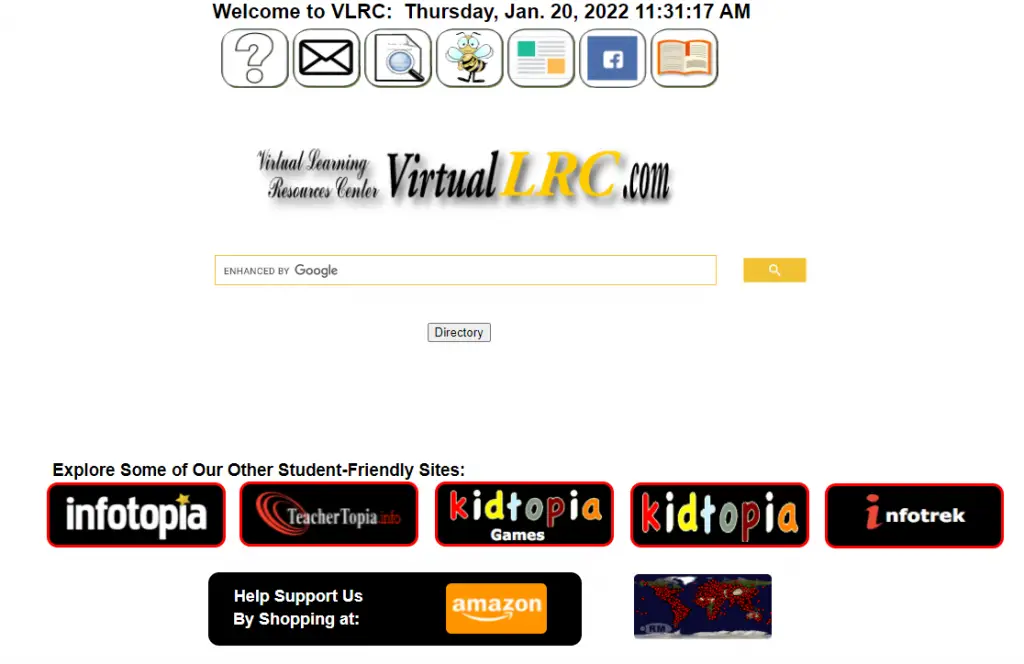
Virtual Learning Resources Center (VLRC) is an academic search engine that features thousands of academic sites chosen by educators and librarians worldwide. Using an index generated from a research portal, university, and library internet subject guides, students and instructors can find current, authoritative information for school.
- Thousands of academic information websites indexed by it. You will also be able to get more refined results with custom Google search, which will speed up your research.
- Many people consider VLRC as one of the best free search engines to start looking for research material.
- TeachThought rated the Virtual LRC #3 in it’s list of 100 Search Engines For Academic Research
- More relevant to education
- More relevant to students

Powered by Google Custom Search Engine (CSE), Jurn is a free online search engine for accessing and downloading free full-text scholarly papers. It was created by David Haden in a public open beta version in February 2009, initially for locating open access electronic journal articles in the arts and humanities.
After the indexing process was completed, a website containing additional public directories of web links to indexed publications was introduced in mid-2009. The Jurn search service and directory has been regularly modified and cleaned since then.
- A great resource for finding academic papers that are behind paywalls.
- The content is updated regularly.uren
Jurn is free to use.
#21. WorldWideScience
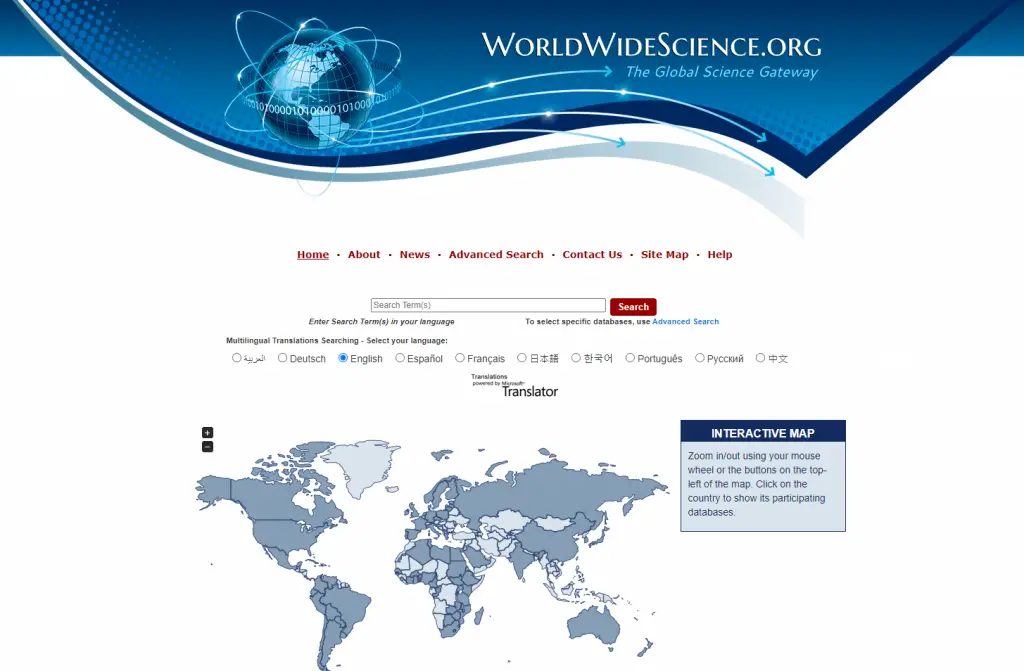
The Office of Scientific and Technical Information—a branch of the Office of Science within the U.S. Department of Energy—hosts the portal WorldWideScience , which has dubbed itself “The Global Science Gateway.”
Over 70 countries’ databases are used on the website. When a user enters a query, it contacts databases from all across the world and shows results in both English and translated journals and academic resources.
- Results can be filtered by language and type of resource
- Interface is easy to use
- Contains both academic journal articles and translated academic resources
- The website can be difficult to navigate.
WorldWideScience is free to use.
#22. Google Books

A user can browse thousands of books on Google Books, from popular titles to old titles, to find pages that include their search terms. You can look through pages, read online reviews, and find out where to buy a hard copy once you find the book you are interested in.
#23. DOAJ (Directory of Open Access Journals)
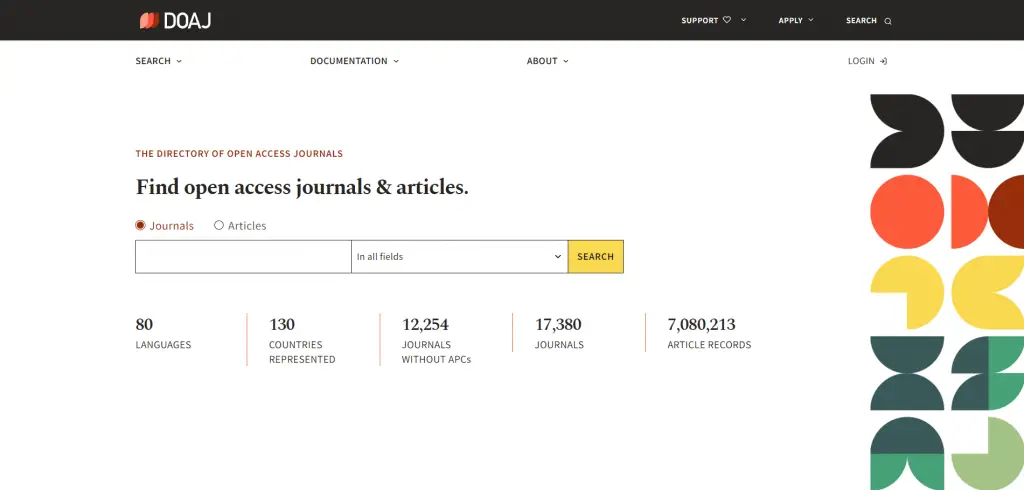
DOAJ is a free search engine for scientific and scholarly materials. It is a searchable database with over 8,000 peer-reviewed research papers organized by subject. It’s one of the most comprehensive libraries of scientific and scholarly resources, with over 8,000 journals available on a variety of themes.
#24. Baidu Scholar

Baidu Xueshu (Academic) is the Chinese version for Google Scholar. IDU Scholar indexes academic papers from a variety of disciplines in both Chinese and English.
- Articles are available in full text PDF.
- Covers a variety of academic disciplines.
- No abstracts are available for most articles, but summaries are provided for some.
- A great portal that takes you to different specialized research platform
- You need to be able to read Chinese to use the site
- Since 2021 there is a rise of focus on China and the Chinese Communist Party
Baidu Scholar is free to use.
#25. PubMed Central
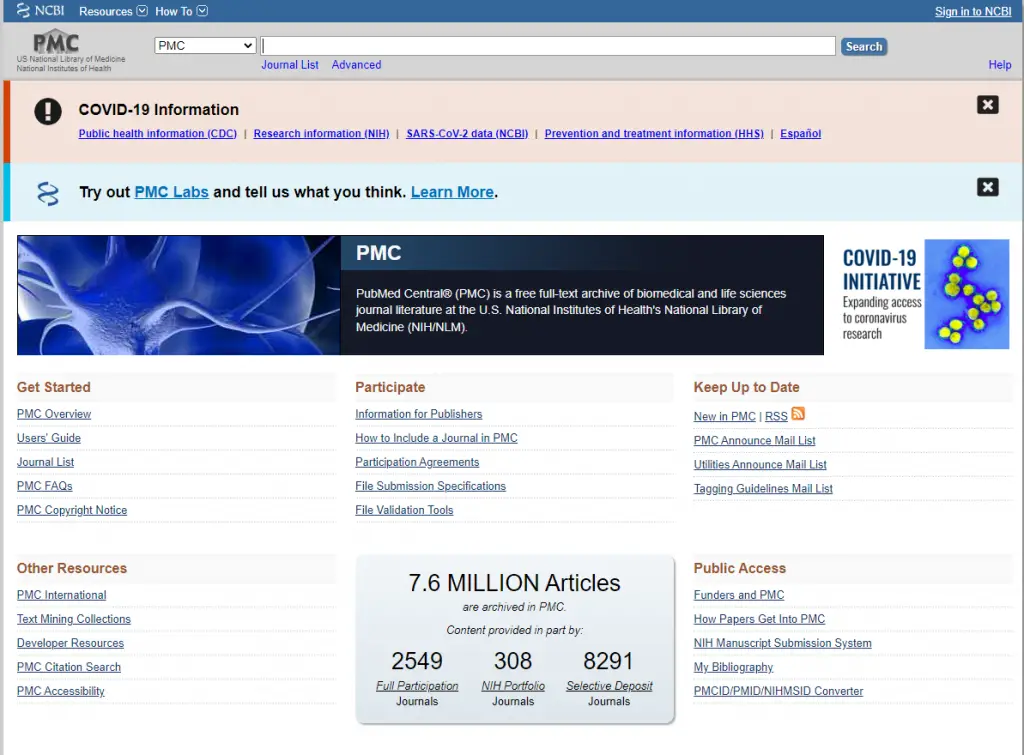
PubMed is a free search engine that provides references and abstracts for medical, life sciences, and biomedical topics.
If you’re studying anything related to healthcare or science, this site is perfect. PublicMed Central is operated by the National Center for Biotechnology Information, a division of the U.S. National Library of Medicine. It contains more than 3 million full-text journal articles.
It’s similar to PubMed Health, which focuses on health-related research and includes abstracts and citations to over 26 million articles.
#26. MEDLINE®
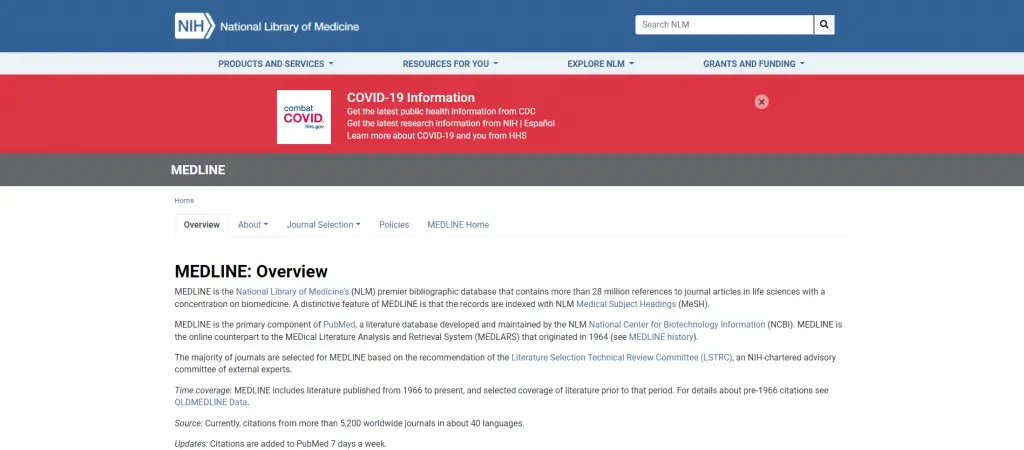
MEDLINE® is a paid subscription database for life sciences and biomedicine that includes more than 28 million citations to journal articles. For finding reliable, carefully chosen health information, Medline Plus provides a powerful search tool and even a dictionary.
- A great database for life sciences and biomedicine.
- Contains more than 28 million references to journal articles.
- References can be filtered by date, type of document, and language.
- The database is expensive to access.
- Some people find it difficult to navigate and find what they are looking for.
MEDLINE is not free to use ( pricing information ).
Defunct Academic Search Engines
#27. microsoft academic .
Microsoft Academic
Microsoft Academic Search seemed to be a failure from the beginning. It ended in 2012, then re-launched in 2016 as Microsoft Academic. It provides the researcher with the opportunity to search academic publications,
Microsoft Academic used to be the second-largest academic search engine after Google Scholar. Microsoft Academic provides a wealth of data for free, but Microsoft has announced that it will shut Microsoft Academic down in by 2022.
#28. Scizzle
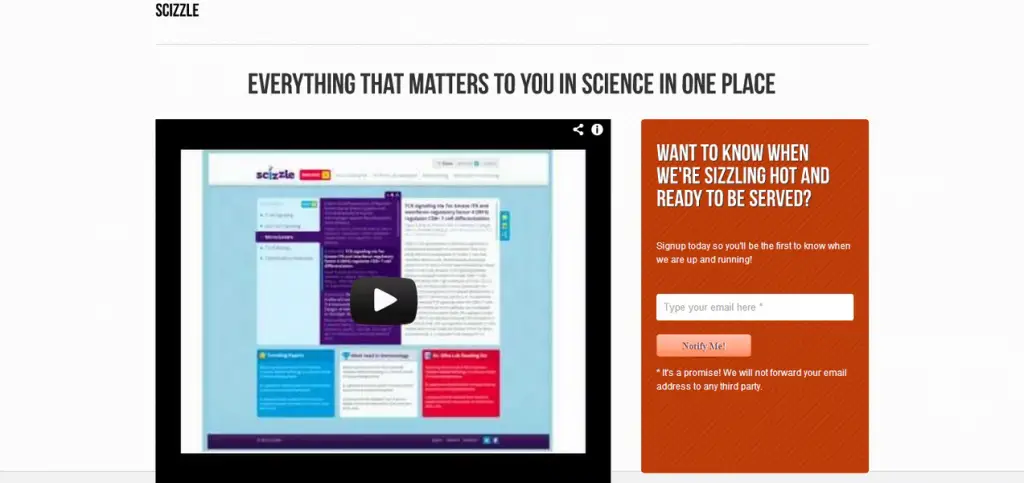
Designed to help researchers stay on top of the literature by setting up email alerts, based on key terms, for newspapers.
Unfortunately, academic search engines come and go. These are two that are no longer available.
Final Thoughts
There are many academic search engines that can help researchers and scholars find the information they need. This list provides a variety of options, starting with more familiar engines and moving on to less well-known ones.
Keeping an open mind and exploring different sources is essential for conducting effective online research. With so much information at our fingertips, it’s important to make sure we’re using the best tools available to us.
Tell us in the comment below which academic search engine have you not heard of? Which database do you think we should add? What database do your professional societies use? What are the most useful academic websites for research in your opinion?
There is more.
Check out our other articles on the Best Academic Tools Series for Research below.
- Learn how to get more done with these Academic Writing Tools
- Learn how to proofread your work with these Proofreading Tools
- Learn how to broaden your research landscape with these Academic Search Engines
- Learn how to manage multiple research projects with these Project Management Tools
- Learn how to run effective survey research with these Survey Tools for Research
- Learn how get more insights from important conversations and interviews with Transcription Tools
- Learn how to manage the ever-growing list of references with these Reference Management Software
- Learn how to double your productivity with literature reviews with these AI-Based Summary Generators
- Learn how to build and develop your audience with these Academic Social Network Sites
- Learn how to make sure your content is original and trustworthy with these Plagiarism Checkers
- Learn how to talk about your work effectively with these Science Communication Tools
10 thoughts on “28 Best Academic Search Engines That make your research easier”
Thank you so much Joannah..I have found this information useful to me as librarian in an academic library
You are welcome! We are happy to hear that!
Thank You Team, for providing a comprehensive list of academic search engines that can help make research easier for students and scholars. The variety of search engines included offers a range of options for finding scholarly articles, journals, and other academic resources. The article also provides a brief summary of each search engine’s features, which helps in determining which one is the best fit for a specific research topic. Overall, this article is a valuable resource for anyone looking for a quick and easy way to access a wealth of academic information.
Thank you for taking the time to share your feedback with us. We are delighted to hear that you found our list of academic search engines helpful in making research easier for students and scholars. We understand the importance of having a variety of options when it comes to finding scholarly articles, journals, and other academic resources, and we strive to provide a comprehensive list of resources to meet those needs.
We are glad that you found the brief summary of each search engine’s features helpful in determining which one is the best fit for a specific research topic. Our goal is to make it easy for our readers to access valuable academic information and we’re glad that we were able to achieve that for you.
We appreciate your support and thank you for your kind words. We will continue to provide valuable resources for students and researchers in the future. Please let us know if you have any further questions or suggestions.
No more questions Thank You
I cannot thank you enough!!! thanks alot 🙂
Typography animation is a technique that combines text and motion to create visually engaging and dynamic animations. It involves animating individual letters, words, or phrases in various ways to convey a message, evoke emotions, or enhance the visual impact of a design or video. – Typography Animation Techniques Tools and Online Software {43}
Hi Joannah! Here’s another one you may want to add! Expontum ( https://www.expontum.com/ ) – Helps researchers quickly find knowledge gaps and identify what research projects have been completed before. Thanks!
Expontum – Helps researchers quickly find knowledge gaps and identify what research projects have been completed before. Expontum is free, open access, and available to all globally with no paid versions of the site. Automated processes scan research article information 24/7 so this website is constantly updating. By looking at over 35 million research publications (240 million by the end of 2023), the site has 146 million tagged research subjects and 122 million tagged research attributes. Learn more about methodology and sources on the Expontum About Page ( https://www.expontum.com/about.php )
Hey Ryan, I clicked and checked your site and thought it was very relevant to our reader. Thank you for sharing. And, we will be reviewing your site soon.
Sounds good! Thanks, Joannah!
Leave a Comment Cancel reply
Save my name, email, and website in this browser for the next time I comment.
We maintain and update science journals and scientific metrics. Scientific metrics data are aggregated from publicly available sources. Please note that we do NOT publish research papers on this platform. We do NOT accept any manuscript.
2012-2024 © scijournal.org
- Resources Home 🏠
- Try SciSpace Copilot
- Search research papers
- Add Copilot Extension
- Try AI Detector
- Try Paraphraser
- Try Citation Generator
- April Papers
- June Papers
- July Papers

Best Academic Search Engines [2024]

Table of Contents
Gone are the days when researchers used to spend hours in the library skimming through endless reference books and resources. Now, thanks to academic search engines — with just a few clicks, researchers can access an extensive amount of information at their fingertips.
However, not all search engines are designed to make the research discovery process easier. It varies from one search engine to another, few might not have updated their database to the latest articles, while others might still provide older articles as a result of your search keyword or topic, and so on. This way, half of the researcher’s time is consumed shortlisting the best academic search engines.
Therefore, to help you choose the best search engine for academic research, we’ve crafted this blog. In this article, we will explore the best academic search engines available and why they are essential for scholars, researchers, and students alike.
Introduction to Academic Search Engines
Academic search engines are online repositories or databases that host millions of research articles and allow users to find relevant scholarly articles, research publications, conference proceedings, and other academic resources. Unlike web search engines like Google or Bing, these platforms are specifically designed to provide accurate, reliable, and relevant academic content.
These search engines often have advanced features that help users filter their search results based on specific criteria. For example, SciSpace helps you filter the results based on author, publication date, PDF, open-access, and more. In addition, it also provides citation information, abstracts, and full-text access to research papers and other scholarly literature, making them invaluable tools for scholars and researchers.
Academic search engines play a crucial role in the research process by providing scholars with easy access to relevant and reliable information. They save researchers valuable time by eliminating the need to sift through irrelevant search results and provide them with free access to a focused pool of academic resources.
With their advanced features and comprehensive coverage, these academic databases empower researchers to stay at the forefront of their fields and contribute to the advancement of knowledge.
Benefits of using reliable academic search engines for research
When it comes to academic research, using reliable search engines is of utmost importance. The credibility and quality of the sources you rely on can significantly impact the results of your research findings and conclusions.
Here are the potential advantages of using a popular search engine!
1. Reliable scholarly source: By using an academic search engine, researchers can ensure that the information they find is from reputable sources. These academic databases typically index content from scholarly journals, universities, research institutions, and other reliable and cited sources. As a result, the risk of using incorrect or biased information, which is prevalent on the open web, is significantly reduced.
2. Increased exposure to enormous articles: With a reliable academic search engine, you can access a vast array of scholarly articles and research publications. These search engines have extensive academic databases that include articles from various disciplines, including science and social sciences, allowing researchers to explore a wide range of topics and find relevant studies to support their research.
3. Advanced search filters: Reliable academic search engines often provide advanced search features that enable researchers to refine their search queries and narrow down the results to find the most relevant and latest information. These features may include filters for publication date, author, journal, and citation count, among others. By utilizing these advanced search terms and options, researchers can save time and effort by quickly finding the most pertinent resources.
4. Access full-text journal articles: Another advantage of using search engine for academic research is the ability to access full-text scientific articles. Many academic search engines provide direct links to the full text of articles, either freely available or through institutional subscriptions. This ensures that researchers can read and analyze the complete article, rather than relying on abstracts or TL;DR summaries.
5. Additional tools support: The most reliable search engines for research like SciSpace offer additional tools and features to enhance the research workflow. These may include citation generators, reference management systems, and options to save and organize search results. These tools can greatly facilitate the organization and the citation analysis of sources, making the research process more efficient and systematic.
Best search engines for research
Now that we’ve understood the importance of using reliable search engines for academic research, let's explore some of the best academic literature search engines available:
1. SciSpace

SciSpace is considered the best academic search engine that hosts and provides free access to a comprehensive index of 300 million+ scholarly articles from various fields. It utilizes advanced algorithms to provide users with highly relevant search results. Its intuitive and user-friendly interface makes it ideal for both novice and experienced researchers to navigate millions of research papers with no mess around.
One of the standout features of SciSpace is its “ Trace feature ” which allows users to find relevant research papers based on the preferred criteria including citation counts, related publications, references, authors, and more. It helps you land on the right research paper based on your preferences or research needs.
SciSpace is the only search engine that not only helps you discover relevant scholarly scientific literature but also allows you to read a research paper using its AI research assistant, conduct a literature review, and generate accurate citations for your research publications. It is an all-in-one platform that accelerates your research workflow with its AI-powered tools. You can explore all of them here
2. Google Scholar

Google Scholar is undoubtedly one of the popular search engines. With its vast database of scholarly literature, Google Scholar allows users to search for articles, theses, books, and conference papers across multiple academic disciplines. Google Scholar helps users save their search queries and set up email alerts for new publications in their field of interest. This ensures that researchers stay up-to-date with the latest developments in their respective fields.

PubMed is a go-to academic search engine for those in the field of medicine and life sciences. Developed by the National Center for Biotechnology Information (NCBI), PubMed provides access to a vast collection of medicine, biomedical, health sciences, or literature, including journals, clinical trials, and scientific articles. Its meticulously curated articles makes it a trusted resource for medical professionals, scientists, researchers, and students alike.

Scopus is a comprehensive database of science that covers a wide range of scholarly literature across multiple disciplines. It offers a vast collection of peer reviewed articles, including publications, conference papers, and patents. With its extensive coverage and powerful search capabilities, Scopus is a valuable tool for researchers looking to explore the latest developments in their respective fields.
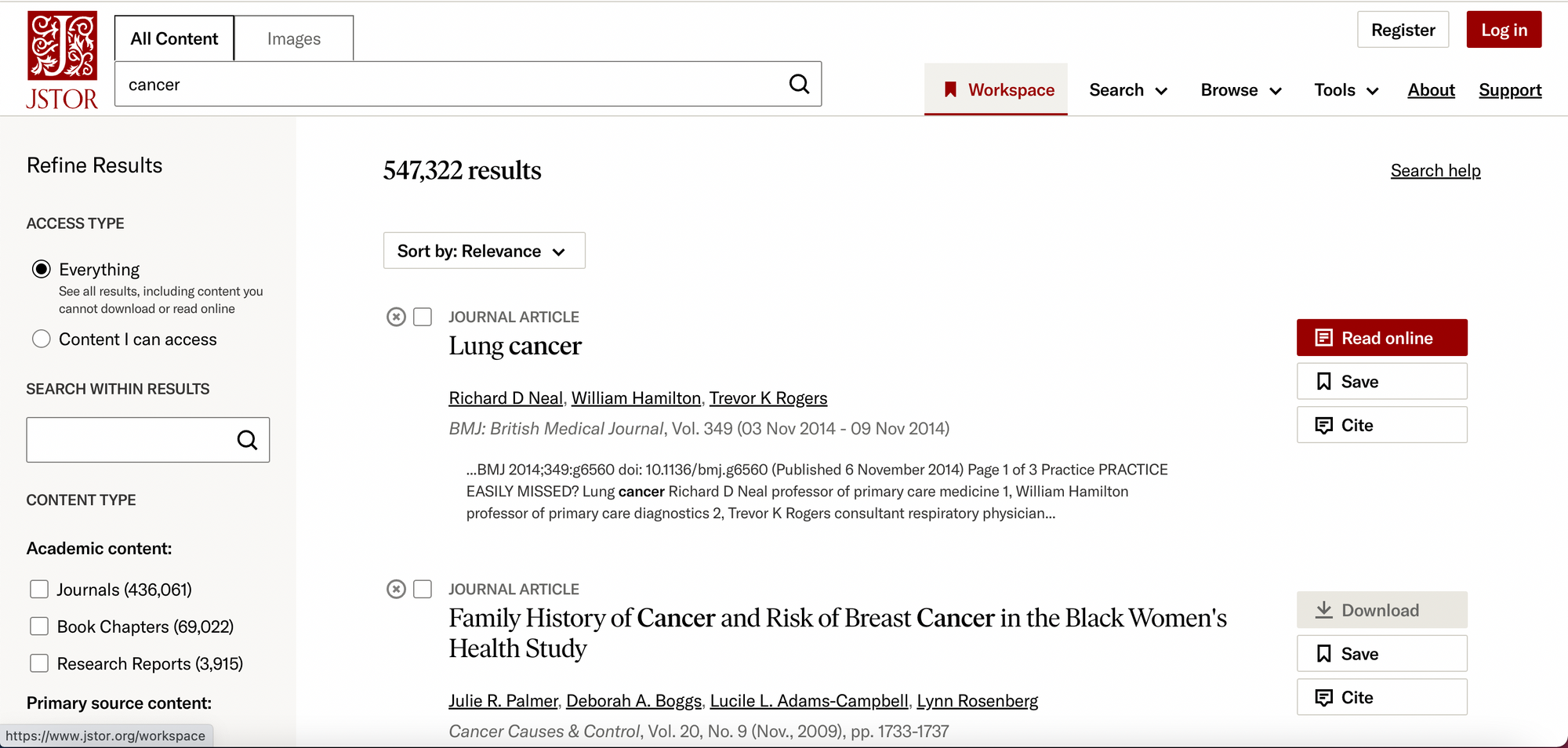
JSTOR is a repository that provides access to a vast collection of academic journals, books, and primary sources. Its interdisciplinary approach makes it a valuable resource for researchers across various fields of study.
6. IEEE Xplore
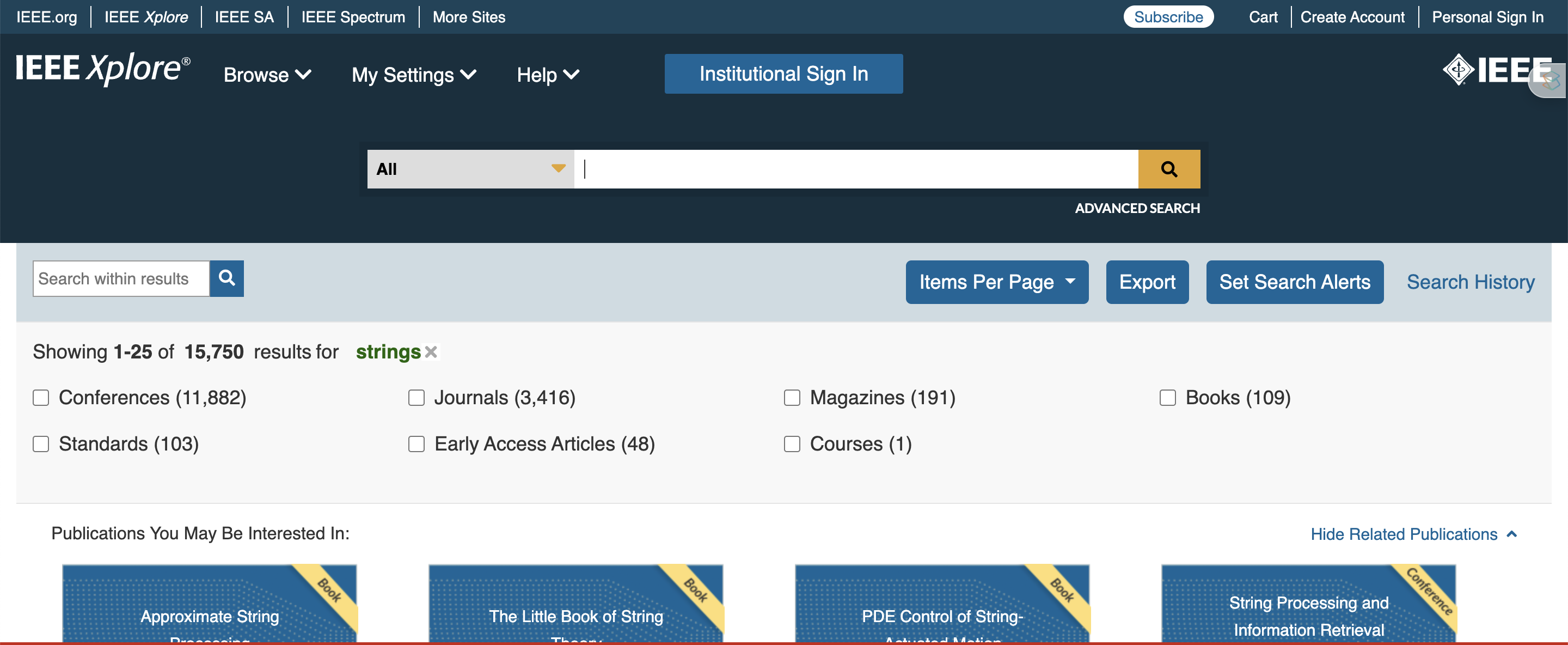
IEEE Xplore is a premier academic search engine for those in the fields of engineering, computer science, and technology. It provides access to a vast collection of technical articles, conference papers, and standards published by the Institute of Electrical and Electronics Engineers (IEEE).
IEEE Xplore is a treasure trove of knowledge for researchers and engineers looking to stay at the forefront of technological advancements.
Criteria for choosing the best academic search engine
With so many free academic search engines to choose from, it can be challenging to determine which one is the best fit for your research needs. Here are some criteria to consider when selecting an academic search engine:
- Relevance: The search engine should provide highly relevant search results that are specific to your area of study.
- Database size: A larger database gives you access to a broader range of scientific literature.
- Advanced search capabilities: Look for search engines that offer advanced search filters, allowing you to refine your search based on specific criteria.
- User-friendly interface: A user-friendly interface makes it easier for researchers to navigate and retrieve the information they need efficiently.
- Accessibility: Consider the availability of full-text or PDF access to articles and the ease of obtaining the necessary permissions to cite or use the content.
In conclusion, academic search engines play a vital role in scholarly communication, facilitating efficient and reliable academic research. They provide scholars, researchers, and students with access to a vast array of scholarly articles, research papers, and other academic resources. By using the best academic search engines, researchers can ensure that their research is backed by evidence (accurate and trustworthy information).
While each search engine has its own unique features and strengths, the key is to choose the one that best aligns with your research needs and preferences. Remember to utilize advanced search filters, explore related articles and citations, and keep your research well-organized for maximum efficiency. As technology continues to advance, we can expect academic search engines to evolve and provide even more innovative solutions to the challenges faced in academic research.
So, embrace these powerful tools, explore the above-featured academic search engines, and let us know which tool you are clinging to!
Frequently Asked Questions
Google Scholar, SciSpace, PubMed, and JSTOR are widely used tools for academic research.
Academic search engineinvolves an in-depth examination of scholarly sources with a rigorous approach, while a Google search engine explores a wider range of web content, including non-academic sources, with varying levels of reliability.
They provide a comprehensive overview of existing research on diverse topics aiding researchers in conducting an efficient literature review without investing more time.
A few more good reads for you!
Elevate Your Writing Game With AI Grammar Checker Tools
How To Humanize AI Text In Scientific Articles
A Guide to Using AI Tools to Summarize Literature Reviews
AI for Essay Writing — Exploring Top 10 Essay Writers
Role of AI in Systematic Literature Review
You might also like

Introducing SciSpace’s Citation Booster To Increase Research Visibility

AI for Meta-Analysis — A Comprehensive Guide

How To Write An Argumentative Essay
A free, AI-powered research tool for scientific literature
- Gary Drobny
- Adult T-cell Leukemia
- Metaphysics
New & Improved API for Developers
Introducing semantic reader in beta.
Stay Connected With Semantic Scholar Sign Up What Is Semantic Scholar? Semantic Scholar is a free, AI-powered research tool for scientific literature, based at the Allen Institute for AI.
🇺🇦 make metadata, not war
A comprehensive bibliographic database of the world’s scholarly literature
The world’s largest collection of open access research papers, machine access to our vast unique full text corpus, core features, indexing the world’s repositories.
We serve the global network of repositories and journals
Comprehensive data coverage
We provide both metadata and full text access to our comprehensive collection through our APIs and Datasets
Powerful services
We create powerful services for researchers, universities, and industry

Cutting-edge solutions
We research and develop innovative data-driven and AI solutions
Committed to the POSI
Cost-free PIDs for your repository
OAI identifiers are unique identifiers minted cost-free by repositories. Ensure that your repository is correctly configured, enabling the CORE OAI Resolver to redirect your identifiers to your repository landing pages.
OAI IDs provide a cost-free option for assigning Persistent Identifiers (PIDs) to your repository records. Learn more.
Who we serve?
Enabling others to create new tools and innovate using a global comprehensive collection of research papers.

“ Our partnership with CORE will provide Turnitin with vast amounts of metadata and full texts that we can ... ” Show more
Gareth Malcolm, Content Partner Manager at Turnitin
Academic institutions.
Making research more discoverable, improving metadata quality, helping to meet and monitor open access compliance.

“ CORE’s role in providing a unified search of repository content is a great tool for the researcher and ex... ” Show more
Nicola Dowson, Library Services Manager at Open University
Researchers & general public.
Tools to find, discover and explore the wealth of open access research. Free for everyone, forever.

“ With millions of research papers available across thousands of different systems, CORE provides an invalu... ” Show more
Jon Tennant, Rogue Paleontologist and Founder of the Open Science MOOC
Helping funders to analyse, audit and monitor open research and accelerate towards open science.

“ Aggregation plays an increasingly essential role in maximising the long-term benefits of open access, hel... ” Show more
Ben Johnson, Research Policy Adviser at Research England
Our services, access to raw data.
Create new and innovative solutions.
Content discovery
Find relevant research and make your research more visible.
Managing content
Manage how your research content is exposed to the world.
Companies using CORE

Gareth Malcolm
Content Partner Manager at Turnitin
Our partnership with CORE will provide Turnitin with vast amounts of metadata and full texts that we can utilise in our plagiarism detection software.
Academic institution using CORE
Kathleen Shearer
Executive Director of the Confederation of Open Access Repositories (COAR)
CORE has significantly assisted the academic institutions participating in our global network with their key mission, which is their scientific content exposure. In addition, CORE has helped our content administrators to showcase the real benefits of repositories via its added value services.
Partner projects

Ben Johnson
Research Policy Adviser
Aggregation plays an increasingly essential role in maximising the long-term benefits of open access, helping to turn the promise of a 'research commons' into a reality. The aggregation services that CORE provides therefore make a very valuable contribution to the evolving open access environment in the UK.


Explore millions of high-quality primary sources and images from around the world, including artworks, maps, photographs, and more.
Explore migration issues through a variety of media types
- Part of The Streets are Talking: Public Forms of Creative Expression from Around the World
- Part of The Journal of Economic Perspectives, Vol. 34, No. 1 (Winter 2020)
- Part of Cato Institute (Aug. 3, 2021)
- Part of University of California Press
- Part of Open: Smithsonian National Museum of African American History & Culture
- Part of Indiana Journal of Global Legal Studies, Vol. 19, No. 1 (Winter 2012)
- Part of R Street Institute (Nov. 1, 2020)
- Part of Leuven University Press
- Part of UN Secretary-General Papers: Ban Ki-moon (2007-2016)
- Part of Perspectives on Terrorism, Vol. 12, No. 4 (August 2018)
- Part of Leveraging Lives: Serbia and Illegal Tunisian Migration to Europe, Carnegie Endowment for International Peace (Mar. 1, 2023)
- Part of UCL Press
Harness the power of visual materials—explore more than 3 million images now on JSTOR.
Enhance your scholarly research with underground newspapers, magazines, and journals.
Explore collections in the arts, sciences, and literature from the world’s leading museums, archives, and scholars.
Eight Ways (and More) To Find and Access Research Papers
This blog is part of our Research Smarter series. You’ll discover the various search engines, databases and data repositories to help you along the way. Click on any of the following links for in an in-depth look at how to find relevant research papers, journals , and authors for your next project using the Web of Science™. You can also check out our ultimate guides here , which include tips to speed up the writing process.
If you’re in the early stages of your research career, you’re likely struggling to learn all you can about your chosen field and evaluate your options. You also need an easy and convenient way to find the right research papers upon which to build your own work and keep you on the proper path toward your goals.
Fortunately, most institutions have access to thousands of journals, so your first step should be to be to check with library staff and find out what is available via your institutional subscriptions.
For those who may be unfamiliar with other means of access, this blog post – the first in a series devoted to helping you “research smarter” – will provide a sampling of established data sources for scientific research. These include search engines, databases, and data repositories.
Search Engines and Databases
You may have already discovered that the process of searching for research papers offers many choices and scenarios. Some search engines, for example, can be accessed free of charge. Others require a subscription. The latter group generally includes services that index the contents of thousands of published journals, allowing for detailed searches on data fields such as author name, institution, title or keyword, and even funding sources. Because many journals operate on a subscription model too, the process of obtaining full-text versions of papers can be complicated.
On the other hand, a growing number of publishers follow the practice of Open Access (OA) , making their journal content freely available. Similarly, some authors publish their results in the form of preprints, posting them to preprint servers for immediate and free access. These repositories, like indexing services, differ in that some concentrate in a given discipline or broad subject area, while others cover the full range of research.
Search Engines
Following is a brief selection of reputable search engines by which to locate articles relevant to your research.
Google Scholar is a free search engine that provides access to research in multiple disciplines. The sources include academic publishers, universities, online repositories, books, and even judicial opinions from court cases. Based on its indexing, Google Scholar provides citation counts to allow authors and others to track the impact of their work.
The Directory of Open Access Journals ( DOAJ ) allows users to search and retrieve the article contents of nearly 10,000 OA journals in science, technology, medicine, social sciences, and humanities. All journals must adhere to quality-control standards, including peer review.
PubMed , maintained by the US National Library of Medicine, is a free search engine covering the biomedical and life sciences. Its coverage derives primarily from the MEDLINE database, covering materials as far back as 1951.
JSTOR affords access to more than 12 million journal articles in upwards of 75 disciplines, providing full-text searches of more than 2,000 journals, and access to more than 5,000 OA books.
Selected Databases
The following selection samples a range of resources, including databases which, as discussed above, index the contents of journals either in a given specialty area or the full spectrum of research. Others listed below offer consolidated coverage of multiple databases. Your institution is likely subscribed to a range of research databases, speak to your librarian to see which databases you have access to, and how to go about your search.
Web of Science includes The Web of Science Core Collection, which covers more than 20,000 carefully selected journals, along with books, conference proceedings, and other sources. The indexing also captures citation data, permitting users to follow the thread of an idea or development over time, as well as to track a wide range of research-performance metrics. The Web of Science also features EndNote™ Click , a free browser plugin that offers one-click access to the best available legal and legitimate full-text versions of papers. See here for our ultimate guide to finding relevant research papers on the Web of Science .
Science.gov covers the vast territory of United States federal science, including more than 60 databases and 2,200-plus websites. The many allied agencies whose research is reflected include NASA, the US Department of Agriculture, and the US Environmental Protection Agency.
CiteSeerx is devoted primarily to information and computer science. The database includes a feature called Autonomous Citation Indexing, designed to extract citations and create a citation index for literature searching and evaluation.
Preprint and Data Repositories
An early form of OA literature involved authors, as noted above, making electronic, preprint versions of their papers freely available. This practice has expanded widely today. You can find archives devoted to a single main specialty area, as well as general repositories connected with universities and other institutions.
The specialty archive is perhaps best exemplified by arXiv (conveniently pronounced “archive,” and one of the earliest examples of a preprint repository). Begun in 1991 as a physics repository, ArXiv has expanded to embrace mathematics, astronomy, statistics, economics, and other disciplines. The success of ArXiv spurred the development of, for example, bioArXiv devoted to an array of topics within biology, and for chemistry, ChemRxiv .
Meanwhile, thousands of institutional repositories hold a variety of useful materials. In addition to research papers, these archives store raw datasets, graphics, notes, and other by-products of investigation. Currently, the Registry of Open Access Repositories lists more than 4,700 entries.
Reach Out Yourself?
If the resources above don’t happen to result in a free and full-text copy of the research you seek, you can also try reaching out to the authors yourself.
To find who authored a paper, you can search indexing platforms like the Web of Science , or research profiling systems like Publons™ , or ResearchGate , then look to reach out to the authors directly.
So, although the sheer volume of research can pose a challenge to identifying and securing needed papers, plenty of options are available.
Related posts
Clarivate welcomes the barcelona declaration on open research information.

Demonstrating socioeconomic impact – a historical perspective of ancient wisdom and modern challenges

Unlocking U.K. research excellence: Key insights from the Research Professional News Live summit

- Submit your COVID-19 Pandemic Research
- Research Leap Manual on Academic Writing
- Conduct Your Survey Easily
- Research Tools for Primary and Secondary Research
- Useful and Reliable Article Sources for Researchers
- Tips on writing a Research Paper
- Stuck on Your Thesis Statement?
- Out of the Box
- How to Organize the Format of Your Writing
- Argumentative Versus Persuasive. Comparing the 2 Types of Academic Writing Styles
- Very Quick Academic Writing Tips and Advices
- Top 4 Quick Useful Tips for Your Introduction
- Have You Chosen the Right Topic for Your Research Paper?
- Follow These Easy 8 Steps to Write an Effective Paper
- 7 Errors in your thesis statement
- How do I even Write an Academic Paper?
- Useful Tips for Successful Academic Writing
Collaborative Governance in Government Administration in the Field of State Security Along the Republic of Indonesia (RI)-Malaysia Border Area
It service management system practices in kenya, introduction economic and psychological well-being during covid-19 pandemic in albania, a need for sustainability.
- Designing a Framework for Assessing Agripreneurship Action for the Green Scheme Irrigation Projects, Namibia
- The Potential Utilisation of Artificial Intelligence (AI) in Enterprises
- Case Study – Developing a National Research and Evidence Base for The Health and Wellbeing Chapter of The Welsh Government’s 2023 Innovation Strategy for Wales
- The Impacts of Technology Innovation on Customer Satisfaction, Employee and Leadership Commitment in CSR Practice
- Current Developments on the Chinese Real Estate Market
- Slide Share
Best search engines for researchers

If you’re researching for your current paper, the first thing that comes to mind is to check Google for the latest advancement in a related field. While Google may be quite handy for listing relevant theories and examples of successful practice, it is not so much scientist-friendly as it is layperson-friendly. There are many other options and available search engines for researchers. As an experienced scholar, you are probably aware that science is fast progressing activity, and that hundreds and even thousands of articles are published daily, especially when your topic concerns a hot issue. When a subject is generating multiple responses from across the disciplines, you must consider all relevant research search engines and make sure to include in your reference list the latest advances.
Also check out our guide on Research Tools for Primary and Secondary Research
Therefore, you want to use your time sparingly and to be able to filter through by year of publishing or find arguments of top-notch academics by name. When collecting data online, use the best research engines that will help you assemble relevant information. Here are some suggestions on best scholar engines that will help you collect key data without having to dig up through a mass of irrelevant, unindexed and low-quality sites.

Here you can find a list of the best academic search engines to help you get your research started .
Google Scholar
As indicated by the name, Google Scholar is one of the best search engines for researchers provided by Google. It is much like your regular search engine, but it lists relevant scholarly articles and helps to acquire support for your research. Google Scholar indexes papers from a variety of sources, such as academic publishers, professional societies, online repositories, universities, and scientific platforms and social sites. You can simply type keywords related to your topic, filter by year of publication or by author, and it will come up with many sources for books, e-books, papers, articles, case studies, working papers, dissertations, etc.
Academic Info
On the top of our list of research search engines, Academic info is an in-depth directory containing useful links and resources from a specified field. It was developed as an alternative to Google in 1998, posing as a source of authoritative educational content. The website provides an extensive list of influential research sites. The website also offers aspiring students who want to enhance professional credentials and eager-to-improve scientists with a myriad of degrees, online courses and remote learning programs from accredited higher education facilities.
iSeek Education
iSeek is a note-worthy and one of prominent search engines for researchers available online. It was tailored explicitly for students, teachers, scientists, academics, analysts and experts. Using iSeek instead of your regular Google unrelated search allows you to invest time in writing instead of spending hours scrolling to irrelevant resources.
WorldCat is the world’s largest network of library content and services. You can search for popular books, music, audiobooks and videos – all of the physical items you’re used to getting from the library. Moreover, you can access digital content downloadable as audiobooks, article citations with links to their full text, esteemed research materials, documents and photos of local and historic significance and digital versions of rare items that aren’t available to the public.
You can also read our tips for getting published in a research journal
If you’re targeting high-quality journals for publication, then the resources you use most definitely must be from high-profile and influential sources. This list of search engines for researchers should help to get you started and save time you can rather invest in perfecting your submission.
Suggested Articles

How to Find Useful and Reliable Article Sources for Researchers

The Role of Primary and Secondary Research Tools in Your Survey Try a New Method…

How to conduct your survey easily For all types of researchers

How to write a Research Paper fbq('track', 'ViewContent', { content_ids: 'PPT writing view', });
Related Posts

Comments are closed.
Reference management. Clean and simple.
Google Scholar: the ultimate guide
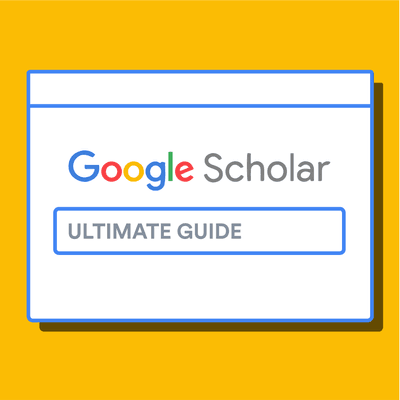
What is Google Scholar?
Why is google scholar better than google for finding research papers, the google scholar search results page, the first two lines: core bibliographic information, quick full text-access options, "cited by" count and other useful links, tips for searching google scholar, 1. google scholar searches are not case sensitive, 2. use keywords instead of full sentences, 3. use quotes to search for an exact match, 3. add the year to the search phrase to get articles published in a particular year, 4. use the side bar controls to adjust your search result, 5. use boolean operator to better control your searches, google scholar advanced search interface, customizing search preferences and options, using the "my library" feature in google scholar, the scope and limitations of google scholar, alternatives to google scholar, country-specific google scholar sites, frequently asked questions about google scholar, related articles.
Google Scholar (GS) is a free academic search engine that can be thought of as the academic version of Google. Rather than searching all of the indexed information on the web, it searches repositories of:
- universities
- scholarly websites
This is generally a smaller subset of the pool that Google searches. It's all done automatically, but most of the search results tend to be reliable scholarly sources.
However, Google is typically less careful about what it includes in search results than more curated, subscription-based academic databases like Scopus and Web of Science . As a result, it is important to take some time to assess the credibility of the resources linked through Google Scholar.
➡️ Take a look at our guide on the best academic databases .
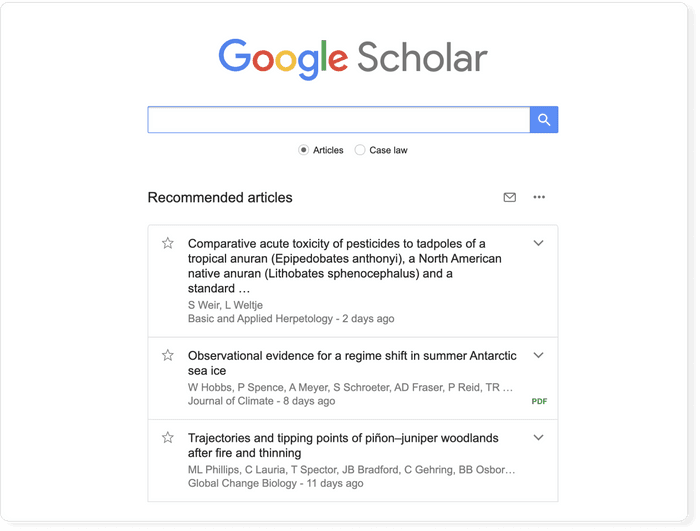
One advantage of using Google Scholar is that the interface is comforting and familiar to anyone who uses Google. This lowers the learning curve of finding scholarly information .
There are a number of useful differences from a regular Google search. Google Scholar allows you to:
- copy a formatted citation in different styles including MLA and APA
- export bibliographic data (BibTeX, RIS) to use with reference management software
- explore other works have cited the listed work
- easily find full text versions of the article
Although it is free to search in Google Scholar, most of the content is not freely available. Google does its best to find copies of restricted articles in public repositories. If you are at an academic or research institution, you can also set up a library connection that allows you to see items that are available through your institution.
The Google Scholar results page differs from the Google results page in a few key ways. The search result page is, however, different and it is worth being familiar with the different pieces of information that are shown. Let's have a look at the results for the search term "machine learning.”
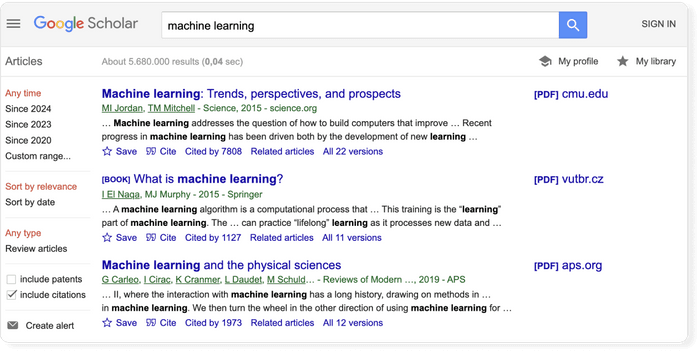
- The first line of each result provides the title of the document (e.g. of an article, book, chapter, or report).
- The second line provides the bibliographic information about the document, in order: the author(s), the journal or book it appears in, the year of publication, and the publisher.
Clicking on the title link will bring you to the publisher’s page where you may be able to access more information about the document. This includes the abstract and options to download the PDF.

To the far right of the entry are more direct options for obtaining the full text of the document. In this example, Google has also located a publicly available PDF of the document hosted at umich.edu . Note, that it's not guaranteed that it is the version of the article that was finally published in the journal.

Below the text snippet/abstract you can find a number of useful links.
- Cited by : the cited by link will show other articles that have cited this resource. That is a super useful feature that can help you in many ways. First, it is a good way to track the more recent research that has referenced this article, and second the fact that other researches cited this document lends greater credibility to it. But be aware that there is a lag in publication type. Therefore, an article published in 2017 will not have an extensive number of cited by results. It takes a minimum of 6 months for most articles to get published, so even if an article was using the source, the more recent article has not been published yet.
- Versions : this link will display other versions of the article or other databases where the article may be found, some of which may offer free access to the article.
- Quotation mark icon : this will display a popup with commonly used citation formats such as MLA, APA, Chicago, Harvard, and Vancouver that may be copied and pasted. Note, however, that the Google Scholar citation data is sometimes incomplete and so it is often a good idea to check this data at the source. The "cite" popup also includes links for exporting the citation data as BibTeX or RIS files that any major reference manager can import.
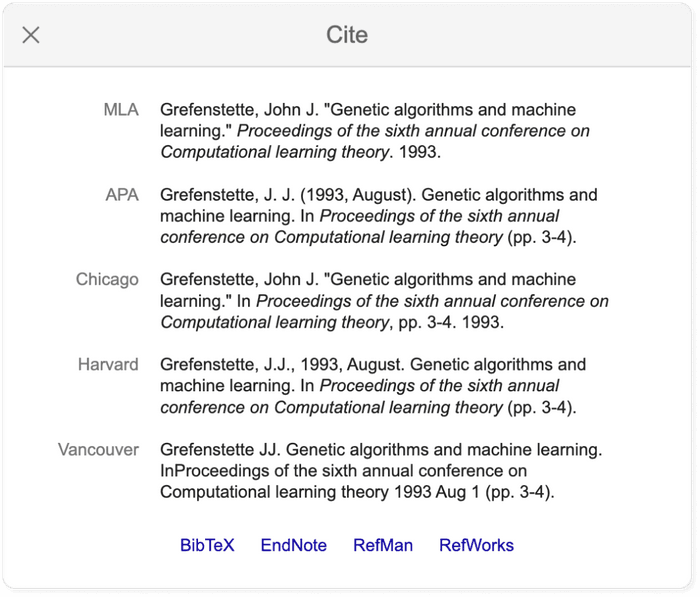
Pro tip: Use a reference manager like Paperpile to keep track of all your sources. Paperpile integrates with Google Scholar and many popular academic research engines and databases, so you can save references and PDFs directly to your library using the Paperpile buttons and later cite them in thousands of citation styles:
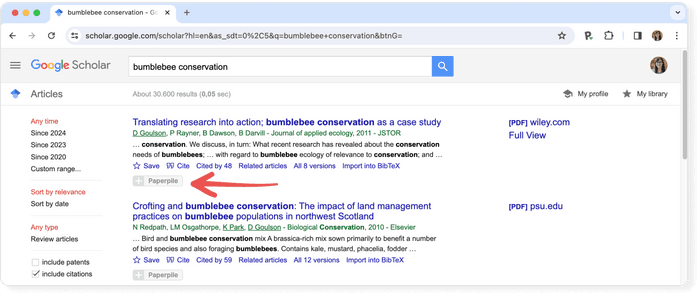
Although Google Scholar limits each search to a maximum of 1,000 results , it's still too much to explore, and you need an effective way of locating the relevant articles. Here’s a list of pro tips that will help you save time and search more effectively.
You don’t need to worry about case sensitivity when you’re using Google scholar. In other words, a search for "Machine Learning" will produce the same results as a search for "machine learning.”
Let's say your research topic is about self driving cars. For a regular Google search we might enter something like " what is the current state of the technology used for self driving cars ". In Google Scholar, you will see less than ideal results for this query .
The trick is to build a list of keywords and perform searches for them like self-driving cars, autonomous vehicles, or driverless cars. Google Scholar will assist you on that: if you start typing in the search field you will see related queries suggested by Scholar!
If you put your search phrase into quotes you can search for exact matches of that phrase in the title and the body text of the document. Without quotes, Google Scholar will treat each word separately.
This means that if you search national parks , the words will not necessarily appear together. Grouped words and exact phrases should be enclosed in quotation marks.
A search using “self-driving cars 2015,” for example, will return articles or books published in 2015.
Using the options in the left hand panel you can further restrict the search results by limiting the years covered by the search, the inclusion or exclude of patents, and you can sort the results by relevance or by date.
Searches are not case sensitive, however, there are a number of Boolean operators you can use to control the search and these must be capitalized.
- AND requires both of the words or phrases on either side to be somewhere in the record.
- NOT can be placed in front of a word or phrases to exclude results which include them.
- OR will give equal weight to results which match just one of the words or phrases on either side.
➡️ Read more about how to efficiently search online databases for academic research .
In case you got overwhelmed by the above options, here’s some illustrative examples:
Tip: Use the advanced search features in Google Scholar to narrow down your search results.
You can gain even more fine-grained control over your search by using the advanced search feature. This feature is available by clicking on the hamburger menu in the upper left and selecting the "Advanced search" menu item.
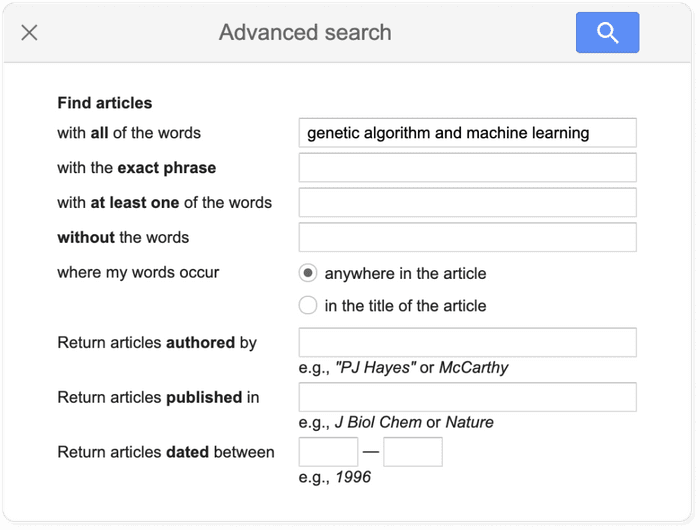
Adjusting the Google Scholar settings is not necessary for getting good results, but offers some additional customization, including the ability to enable the above-mentioned library integrations.
The settings menu is found in the hamburger menu located in the top left of the Google Scholar page. The settings are divided into five sections:
- Collections to search: by default Google scholar searches articles and includes patents, but this default can be changed if you are not interested in patents or if you wish to search case law instead.
- Bibliographic manager: you can export relevant citation data via the “Bibliography manager” subsection.
- Languages: if you wish for results to return only articles written in a specific subset of languages, you can define that here.
- Library links: as noted, Google Scholar allows you to get the Full Text of articles through your institution’s subscriptions, where available. Search for, and add, your institution here to have the relevant link included in your search results.
- Button: the Scholar Button is a Chrome extension which adds a dropdown search box to your toolbar. This allows you to search Google Scholar from any website. Moreover, if you have any text selected on the page and then click the button it will display results from a search on those words when clicked.
When signed in, Google Scholar adds some simple tools for keeping track of and organizing the articles you find. These can be useful if you are not using a full academic reference manager.
All the search results include a “save” button at the end of the bottom row of links, clicking this will add it to your "My Library".
To help you provide some structure, you can create and apply labels to the items in your library. Appended labels will appear at the end of the article titles. For example, the following article has been assigned a “RNA” label:

Within your Google Scholar library, you can also edit the metadata associated with titles. This will often be necessary as Google Scholar citation data is often faulty.
There is no official statement about how big the Scholar search index is, but unofficial estimates are in the range of about 160 million , and it is supposed to continue to grow by several million each year.
Yet, Google Scholar does not return all resources that you may get in search at you local library catalog. For example, a library database could return podcasts, videos, articles, statistics, or special collections. For now, Google Scholar has only the following publication types:
- Journal articles : articles published in journals. It's a mixture of articles from peer reviewed journals, predatory journals and pre-print archives.
- Books : links to the Google limited version of the text, when possible.
- Book chapters : chapters within a book, sometimes they are also electronically available.
- Book reviews : reviews of books, but it is not always apparent that it is a review from the search result.
- Conference proceedings : papers written as part of a conference, typically used as part of presentation at the conference.
- Court opinions .
- Patents : Google Scholar only searches patents if the option is selected in the search settings described above.
The information in Google Scholar is not cataloged by professionals. The quality of the metadata will depend heavily on the source that Google Scholar is pulling the information from. This is a much different process to how information is collected and indexed in scholarly databases such as Scopus or Web of Science .
➡️ Visit our list of the best academic databases .
Google Scholar is by far the most frequently used academic search engine , but it is not the only one. Other academic search engines include:
- Science.gov
- Semantic Scholar
- scholar.google.fr : Sur les épaules d'un géant
- scholar.google.es (Google Académico): A hombros de gigantes
- scholar.google.pt (Google Académico): Sobre os ombros de gigantes
- scholar.google.de : Auf den Schultern von Riesen
➡️ Once you’ve found some research, it’s time to read it. Take a look at our guide on how to read a scientific paper .
No. Google Scholar is a bibliographic search engine rather than a bibliographic database. In order to qualify as a database Google Scholar would need to have stable identifiers for its records.
No. Google Scholar is an academic search engine, but the records found in Google Scholar are scholarly sources.
No. Google Scholar collects research papers from all over the web, including grey literature and non-peer reviewed papers and reports.
Google Scholar does not provide any full text content itself, but links to the full text article on the publisher page, which can either be open access or paywalled content. Google Scholar tries to provide links to free versions, when possible.
The easiest way to access Google scholar is by using The Google Scholar Button. This is a browser extension that allows you easily access Google Scholar from any web page. You can install it from the Chrome Webstore .


The best AI tools for research papers and academic research (Literature review, grants, PDFs and more)
As our collective understanding and application of artificial intelligence (AI) continues to evolve, so too does the realm of academic research. Some people are scared by it while others are openly embracing the change.
Make no mistake, AI is here to stay!
Instead of tirelessly scrolling through hundreds of PDFs, a powerful AI tool comes to your rescue, summarizing key information in your research papers. Instead of manually combing through citations and conducting literature reviews, an AI research assistant proficiently handles these tasks.
These aren’t futuristic dreams, but today’s reality. Welcome to the transformative world of AI-powered research tools!
This blog post will dive deeper into these tools, providing a detailed review of how AI is revolutionizing academic research. We’ll look at the tools that can make your literature review process less tedious, your search for relevant papers more precise, and your overall research process more efficient and fruitful.
I know that I wish these were around during my time in academia. It can be quite confronting when trying to work out what ones you should and shouldn’t use. A new one seems to be coming out every day!
Here is everything you need to know about AI for academic research and the ones I have personally trialed on my YouTube channel.
My Top AI Tools for Researchers and Academics – Tested and Reviewed!
There are many different tools now available on the market but there are only a handful that are specifically designed with researchers and academics as their primary user.
These are my recommendations that’ll cover almost everything that you’ll want to do:
Want to find out all of the tools that you could use?
Here they are, below:
AI literature search and mapping – best AI tools for a literature review – elicit and more
Harnessing AI tools for literature reviews and mapping brings a new level of efficiency and precision to academic research. No longer do you have to spend hours looking in obscure research databases to find what you need!
AI-powered tools like Semantic Scholar and elicit.org use sophisticated search engines to quickly identify relevant papers.
They can mine key information from countless PDFs, drastically reducing research time. You can even search with semantic questions, rather than having to deal with key words etc.
With AI as your research assistant, you can navigate the vast sea of scientific research with ease, uncovering citations and focusing on academic writing. It’s a revolutionary way to take on literature reviews.
- Elicit – https://elicit.org
- Litmaps – https://www.litmaps.com
- Research rabbit – https://www.researchrabbit.ai/
- Connected Papers – https://www.connectedpapers.com/
- Supersymmetry.ai: https://www.supersymmetry.ai
- Semantic Scholar: https://www.semanticscholar.org
- Laser AI – https://laser.ai/
- Inciteful – https://inciteful.xyz/
- Scite – https://scite.ai/
- System – https://www.system.com
If you like AI tools you may want to check out this article:
- How to get ChatGPT to write an essay [The prompts you need]
AI-powered research tools and AI for academic research
AI research tools, like Concensus, offer immense benefits in scientific research. Here are the general AI-powered tools for academic research.
These AI-powered tools can efficiently summarize PDFs, extract key information, and perform AI-powered searches, and much more. Some are even working towards adding your own data base of files to ask questions from.
Tools like scite even analyze citations in depth, while AI models like ChatGPT elicit new perspectives.
The result? The research process, previously a grueling endeavor, becomes significantly streamlined, offering you time for deeper exploration and understanding. Say goodbye to traditional struggles, and hello to your new AI research assistant!
- Consensus – https://consensus.app/
- Iris AI – https://iris.ai/
- Research Buddy – https://researchbuddy.app/
- Mirror Think – https://mirrorthink.ai
AI for reading peer-reviewed papers easily
Using AI tools like Explain paper and Humata can significantly enhance your engagement with peer-reviewed papers. I always used to skip over the details of the papers because I had reached saturation point with the information coming in.
These AI-powered research tools provide succinct summaries, saving you from sifting through extensive PDFs – no more boring nights trying to figure out which papers are the most important ones for you to read!
They not only facilitate efficient literature reviews by presenting key information, but also find overlooked insights.
With AI, deciphering complex citations and accelerating research has never been easier.
- Aetherbrain – https://aetherbrain.ai
- Explain Paper – https://www.explainpaper.com
- Chat PDF – https://www.chatpdf.com
- Humata – https://www.humata.ai/
- Lateral AI – https://www.lateral.io/
- Paper Brain – https://www.paperbrain.study/
- Scholarcy – https://www.scholarcy.com/
- SciSpace Copilot – https://typeset.io/
- Unriddle – https://www.unriddle.ai/
- Sharly.ai – https://www.sharly.ai/
- Open Read – https://www.openread.academy
AI for scientific writing and research papers
In the ever-evolving realm of academic research, AI tools are increasingly taking center stage.
Enter Paper Wizard, Jenny.AI, and Wisio – these groundbreaking platforms are set to revolutionize the way we approach scientific writing.
Together, these AI tools are pioneering a new era of efficient, streamlined scientific writing.
- Jenny.AI – https://jenni.ai/ (20% off with code ANDY20)
- Yomu – https://www.yomu.ai
- Wisio – https://www.wisio.app
AI academic editing tools
In the realm of scientific writing and editing, artificial intelligence (AI) tools are making a world of difference, offering precision and efficiency like never before. Consider tools such as Paper Pal, Writefull, and Trinka.
Together, these tools usher in a new era of scientific writing, where AI is your dedicated partner in the quest for impeccable composition.
- PaperPal – https://paperpal.com/
- Writefull – https://www.writefull.com/
- Trinka – https://www.trinka.ai/
AI tools for grant writing
In the challenging realm of science grant writing, two innovative AI tools are making waves: Granted AI and Grantable.
These platforms are game-changers, leveraging the power of artificial intelligence to streamline and enhance the grant application process.
Granted AI, an intelligent tool, uses AI algorithms to simplify the process of finding, applying, and managing grants. Meanwhile, Grantable offers a platform that automates and organizes grant application processes, making it easier than ever to secure funding.
Together, these tools are transforming the way we approach grant writing, using the power of AI to turn a complex, often arduous task into a more manageable, efficient, and successful endeavor.
- Granted AI – https://grantedai.com/
- Grantable – https://grantable.co/
Best free AI research tools
There are many different tools online that are emerging for researchers to be able to streamline their research processes. There’s no need for convience to come at a massive cost and break the bank.
The best free ones at time of writing are:
- Elicit – https://elicit.org
- Connected Papers – https://www.connectedpapers.com/
- Litmaps – https://www.litmaps.com ( 10% off Pro subscription using the code “STAPLETON” )
- Consensus – https://consensus.app/
Wrapping up
The integration of artificial intelligence in the world of academic research is nothing short of revolutionary.
With the array of AI tools we’ve explored today – from research and mapping, literature review, peer-reviewed papers reading, scientific writing, to academic editing and grant writing – the landscape of research is significantly transformed.
The advantages that AI-powered research tools bring to the table – efficiency, precision, time saving, and a more streamlined process – cannot be overstated.
These AI research tools aren’t just about convenience; they are transforming the way we conduct and comprehend research.
They liberate researchers from the clutches of tedium and overwhelm, allowing for more space for deep exploration, innovative thinking, and in-depth comprehension.
Whether you’re an experienced academic researcher or a student just starting out, these tools provide indispensable aid in your research journey.
And with a suite of free AI tools also available, there is no reason to not explore and embrace this AI revolution in academic research.
We are on the precipice of a new era of academic research, one where AI and human ingenuity work in tandem for richer, more profound scientific exploration. The future of research is here, and it is smart, efficient, and AI-powered.
Before we get too excited however, let us remember that AI tools are meant to be our assistants, not our masters. As we engage with these advanced technologies, let’s not lose sight of the human intellect, intuition, and imagination that form the heart of all meaningful research. Happy researching!
Thank you to Ivan Aguilar – Ph.D. Student at SFU (Simon Fraser University), for starting this list for me!

Dr Andrew Stapleton has a Masters and PhD in Chemistry from the UK and Australia. He has many years of research experience and has worked as a Postdoctoral Fellow and Associate at a number of Universities. Although having secured funding for his own research, he left academia to help others with his YouTube channel all about the inner workings of academia and how to make it work for you.
Thank you for visiting Academia Insider.
We are here to help you navigate Academia as painlessly as possible. We are supported by our readers and by visiting you are helping us earn a small amount through ads and affiliate revenue - Thank you!

2024 © Academia Insider
Thank you for visiting nature.com. You are using a browser version with limited support for CSS. To obtain the best experience, we recommend you use a more up to date browser (or turn off compatibility mode in Internet Explorer). In the meantime, to ensure continued support, we are displaying the site without styles and JavaScript.
- View all journals
- Explore content
- About the journal
- Publish with us
- Sign up for alerts
- 29 April 2024
How reliable is this research? Tool flags papers discussed on PubPeer
- Dalmeet Singh Chawla
You can also search for this author in PubMed Google Scholar

RedacTek’s tool alerts users to PubPeer discussions, and indicates when a study, or the papers that it cites, has been retracted. Credit: deepblue4you/Getty
A free online tool released earlier this month alerts researchers when a paper cites studies that are mentioned on the website PubPeer , a forum scientists often use to raise integrity concerns surrounding published papers.
Studies are usually flagged on PubPeer when readers have suspicions, for example about image manipulation , plagiarism , data fabrication or artificial intelligence (AI)-generated text . PubPeer already offers its own browser plug-in that alerts users when a study that they are reading has been posted on the site. The new tool, a plug-in released on 13 April by RedacTek , based in Oakland, California, goes further — it searches through reference lists for papers that have been flagged. The software pulls information from many sources, including PubPeer’s database; data from the digital-infrastructure organization Crossref, which assigns digital object identifiers to articles; and OpenAlex , a free index of hundreds of millions of scientific documents.
It’s important to track mentions of referenced articles on PubPeer, says Jodi Schneider, an information scientist at the University of Illinois Urbana-Champaign, who has tried out the RedacTek plug-in. “Not every single reference that’s in the bibliography matters, but some of them do,” she adds. “When you see a large number of problems in somebody’s bibliography, that just calls everything into question.”
The aim of the tool is to flag potential problems with studies to researchers early on, to reduce the circulation of poor-quality science, says RedacTek founder Rick Meyler, based in Emeryville, California. Future versions might also use AI to automatically clarify whether the PubPeer comments on a paper are positive or negative, he adds.
Third-generation retractions
As well as flagging PubPeer discussions, the plug-in indicates when a study, or the papers that it cites, has been retracted. There are existing tools that alert academics about retracted citations ; some can do this during the writing process, so that researchers are aware of the publication status of studies when constructing bibliographies. But with the new tool, users can opt in to receive notifications about further ‘generations’ of retractions — alerts cover not only the study that they are reading, but also the papers it cites, articles cited by those references and even papers cited by the secondary references.
The software also calculates a ‘retraction association value’ for studies, a metric that measures the extent to which the paper is associated with science that has been withdrawn from the literature. As well as informing individual researchers, the plug-in could help scholarly publishers to keep tabs on their own journals, Meyler says, because it allows users to filter by publication.
In its ‘paper scorecard’, the tool also flags any papers in the three generations of referenced studies in which more than 25% of papers in the bibliography are self-citations — references by authors to their previous works.
Future versions could highlight whether papers cited retracted studies before or after the retraction was issued, notes Meyler, or whether mentions of such studies acknowledge the retraction. That would be useful, says Schneider, who co-authored a 2020 analysis that found that as little as 4% of citations to retracted studies note that the referenced paper has been retracted 1 .
Meyler says that RedacTek is currently in talks with scholarly-services firm Cabell’s International in Beaumont, Texas, which maintains pay-to-view lists of suspected predatory journals , which publish articles without proper quality checks for issues such as plagiarism but still collect authors’ fees. The plan is to use these lists to improve the tool so that it can also automatically flag any cited papers that are published in such journals.
doi: https://doi.org/10.1038/d41586-024-01247-6
Schneider, J., Ye, D., Hill, A. M. & Whitehorn, A. S. Scientometrics 125 , 2877–2913 (2020).
Article Google Scholar
Download references
Reprints and permissions
Related Articles

Predatory-journal papers have little scientific impact
Pioneer behind controversial PubPeer site reveals his identity
- Scientific community
Climate-targets group should rescind its endorsement of carbon offsets
Correspondence 30 APR 24

Want to make a difference? Try working at an environmental non-profit organization
Career Feature 26 APR 24

Future of Humanity Institute shuts: what’s next for ‘deep future’ research?
News 26 APR 24

Algorithm ranks peer reviewers by reputation — but critics warn of bias
Nature Index 25 APR 24

Scientists urged to collect royalties from the ‘magic money tree’
Career Feature 25 APR 24

Retractions are part of science, but misconduct isn’t — lessons from a superconductivity lab
Editorial 24 APR 24
W2 Professorship with tenure track to W3 in Animal Husbandry (f/m/d)
The Faculty of Agricultural Sciences at the University of Göttingen invites applications for a temporary professorship with civil servant status (g...
Göttingen (Stadt), Niedersachsen (DE)
Georg-August-Universität Göttingen
W1 professorship for „Tissue Aspects of Immunity and Inflammation“
Kiel University (CAU) and the University of Lübeck (UzL) are striving to increase the proportion of qualified female scientists in research and tea...
University of Luebeck
W1 professorship for "Bioinformatics and artificial intelligence that preserve privacy"
Kiel, Schleswig-Holstein (DE)
Universität Kiel - Medizinische Fakultät
W1 professorship for "Central Metabolic Inflammation“
W1 professorship for "Congenital and adaptive lymphocyte regulation"
Sign up for the Nature Briefing newsletter — what matters in science, free to your inbox daily.
Quick links
- Explore articles by subject
- Guide to authors
- Editorial policies

IMAGES
VIDEO
COMMENTS
Get 30 days free. 1. Google Scholar. Google Scholar is the clear number one when it comes to academic search engines. It's the power of Google searches applied to research papers and patents. It not only lets you find research papers for all academic disciplines for free but also often provides links to full-text PDF files.
Google Scholar provides a simple way to broadly search for scholarly literature. Search across a wide variety of disciplines and sources: articles, theses, books, abstracts and court opinions.
15 Best Academic Research Trend Prediction Platforms. 15 Best Websites To Download Research Papers For Free. #20. Jurn. Powered by Google Custom Search Engine (CSE), Jurn is a free online search engine for accessing and downloading free full-text scholarly papers.
Find the research you need | With 160+ million publications, 1+ million questions, and 25+ million researchers, this is where everyone can access science
2. Google Scholar. Google Scholar. Google Scholar is undoubtedly one of the popular search engines. With its vast database of scholarly literature, Google Scholar allows users to search for articles, theses, books, and conference papers across multiple academic disciplines.
Semantic Reader is an augmented reader with the potential to revolutionize scientific reading by making it more accessible and richly contextual. Try it for select papers. Semantic Scholar uses groundbreaking AI and engineering to understand the semantics of scientific literature to help Scholars discover relevant research.
The best academic search engines [Update 2024] Your research is stuck, and you need to find new sources. Take a look at our compilation of free academic search engines: Google Scholar BASE CORE Science.gov ... You want to add a blog post to your research paper? In general, blogs are not considered to be credible sources: check out these reasons ...
A free online guide to researchers' best search options ... a 'nutrition label' for academic-paper facts. ... for study adaptation to boost health, education and social-science research.
Organize your papers in one place. Try Paperpile. 1. Scopus. Scopus is one of the two big commercial, bibliographic databases that cover scholarly literature from almost any discipline. Besides searching for research articles, Scopus also provides academic journal rankings, author profiles, and an h-index calculator. 2.
Access 160+ million publications and connect with 25+ million researchers. Join for free and gain visibility by uploading your research.
Aggregation plays an increasingly essential role in maximising the long-term benefits of open access, helping to turn the promise of a 'research commons' into a reality. The aggregation services that CORE provides therefore make a very valuable contribution to the evolving open access environment in the UK. Show all.
Harness the power of visual materials—explore more than 3 million images now on JSTOR. Enhance your scholarly research with underground newspapers, magazines, and journals. Explore collections in the arts, sciences, and literature from the world's leading museums, archives, and scholars. JSTOR is a digital library of academic journals ...
RefSeek - Academic Search Engine. Web. Documents. Type 2 or more characters for results. Learn about: Fahrenheit, Trade Deficit. Browse the Reference Site Directory. Academic search engine for students and researchers. Locates relevant academic search results from web pages, books, encyclopedias, and journals.
Google Scholar is a free search engine that provides access to research in multiple disciplines. The sources include academic publishers, universities, online repositories, books, and even judicial opinions from court cases. Based on its indexing, Google Scholar provides citation counts to allow authors and others to track the impact of their work.
Microsoft's academic search engine offers access to more than 38 million different publications, with features including maps, graphing, trends, and paths that show how authors are connected. Google Trends. Google's super cool search tool will allow you to find searches that correlate with real-world data. WolframAlpha.
As indicated by the name, Google Scholar is one of the best search engines for researchers provided by Google. It is much like your regular search engine, but it lists relevant scholarly articles and helps to acquire support for your research. Google Scholar indexes papers from a variety of sources, such as academic publishers, professional ...
Full-text aggregators. The main academic full-text databases are open archives or link-resolution services, although others operate under different models such as mirroring or hybrid publishers. Such services typically provide access to full text and full-text search, but also metadata about items for which no full text is available.. This list focuses on general-purpose services; OpenDOAR can ...
Google Scholar searches are not case sensitive. 2. Use keywords instead of full sentences. 3. Use quotes to search for an exact match. 3. Add the year to the search phrase to get articles published in a particular year. 4. Use the side bar controls to adjust your search result.
3.3 million articles on ScienceDirect are open access. Articles published open access are peer-reviewed and made freely available for everyone to read, download and reuse in line with the user license displayed on the article. ScienceDirect is the world's leading source for scientific, technical, and medical research.
Elsevier Journal Finder helps you find journals that could be best suited for publishing your scientific article. Journal Finder uses smart search technology and field-of-research specific vocabularies to match your paper's abstract to scientific journals.
Linguistics, computer science, mathematics: Google Scholar. Never used something else, though I don't trust its BibTeX entries one bit. If I can, I try to find the publisher's or author's information, or look how the paper is cited in other articles.
AI-powered tools like Semantic Scholar and elicit.org use sophisticated search engines to quickly identify relevant papers. They can mine key information from countless PDFs, drastically reducing research time. You can even search with semantic questions, rather than having to deal with key words etc.
Health Practitioners. Access up-to-date medical literature to inform diagnoses, treatments, and patient care. Discover AI search engine for academic research by HIX Scholar. With this research AI tool, you have free access to the most authoritative papers on any subject.
To obtain the best experience, we recommend you use a more up to date browser (or turn off compatibility mode in Internet Explorer). ... You can also search for this author in PubMed Google ...
Consensus is an AI-powered search engine that concentrates on providing users with unbiased and accurate information from diverse and reliable academic sources. It can search through millions of academic publications to find relevant information to answer questions, provide references, and cite research studies. ... provide references, and cite ...